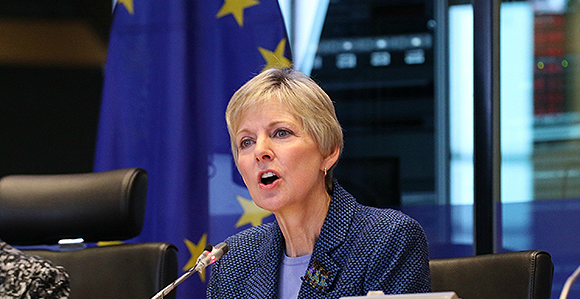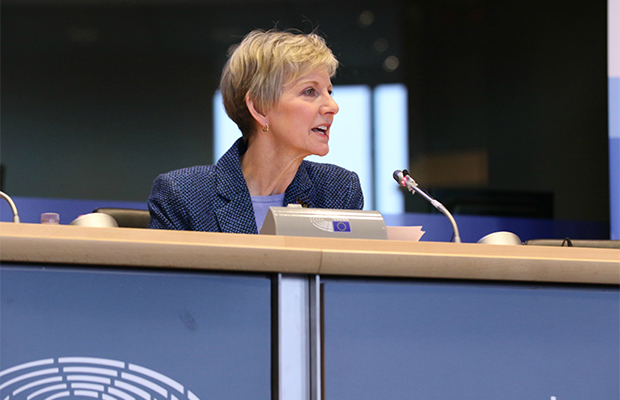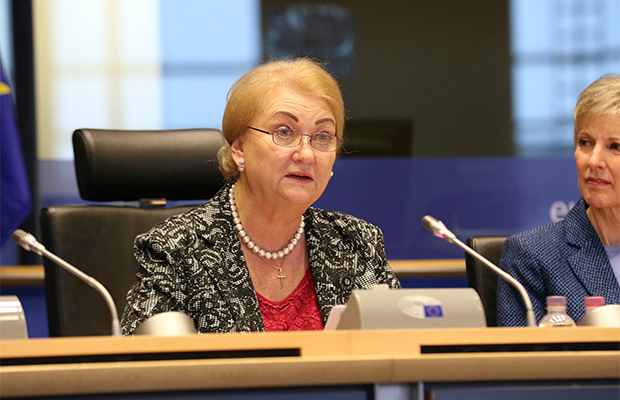Sister Bingham Says Religious Freedom Is Critical to Empowering Women
Contributed By R. Scott Lloyd, Church News staff writer

Sister Jean B. Bingham addresses the “Women in Faith: A Freedom of Religion or Belief Perspective” conference at European Parliament November 9, 2017.
Article Highlights
- A vital part of empowering women is giving them freedom of religion.
- Women’s rights are connected to freedom of belief and religion.
- Laws mandating women’s belief can be harmful even if they are well-intentioned.
“[Women] are a potent force for creating a society where peace, religious freedom, and human rights can truly thrive.” —Sister Jean B. Bingham, Relief Society General President
Related Links
BRUSSELS, BELGIUM
Religious freedom is a critical right for empowering women, Sister Jean B. Bingham, Relief Society General President, declared in a keynote address to a conference of scholars and dignitaries at the European Parliament in Brussels on Thursday, November 9.
The “Women in Faith: A Freedom of Religion or Belief Perspective” conference was hosted by Anna Záborská, a member of the European Parliament, in partnership with the Church’s European Union Office, according to a news release posted on the Church’s United Kingdom Newsroom website.
Hoping to offer understanding on why religious freedom is so critical, Sister Bingham focused on three points: the importance of religious devotion to women, the “intimate connection between freedom of religion or belief with women’s other rights,” and “how laws that mandate women’s belief or behavior can be harmful, even if well-intentioned.”
The importance of religious devotion to women
On the first point, Sister Bingham affirmed that the freedom to search for life’s meaning and to believe that a higher power has provided that meaning belongs to women as much as to men.
“Indeed, an ‘estimated 97 million more women than men claim a religious affiliation,’” she said, quoting the Pew Research Center’s Religion & Public Life Project of March 22, 2016.
“Religious freedom is among the most important freedoms a woman can have in societies where cultural traditions might seek to impose upon her a lesser conception of her life’s meaning,” Sister Bingham observed.
She recounted the episode in which Elizabeth Smart, 14, was abducted from her Salt Lake City home June 5, 2002, tethered to a tree, deprived of food, forced to consume alcohol and drugs, and raped daily for months before being rescued.
“Elizabeth Smart lived in a country where she could hold to her faith,” Sister Bingham said. “That faith carried her through some of the worst things people can suffer. Yet, in a striking contrast, her victimization was committed in the name of religion. When she was found on March 12, 2003, she had been dressed in robes and her face veiled. Her captor claimed to be a prophet.”
Women can be the victims of terrible acts committed in the name of faith, Sister Bingham said. “Violent acts like these can overshadow the great good that religious faith and devotion can help women accomplish in our society.”
If the negative narrative dominates, consequences might occur, such as well-intentioned governments overriding freedom of religion in ways that harm instead of help women, Sister Bingham warned.
The “intimate connection between freedom of religion or belief with women’s other rights”
On her second point, she asserted that protecting women’s freedom or belief empowers them as well as their communities.
Citing Article 9 of the European Convention on Human Rights, which provides that everyone has the right to freedom of thought, conscience, and religion, she said, “These rights are part of a seamless whole which cannot be delinked from women without harm to them.”
The article also provides protections against individuals that may seek to abuse religious freedom, she noted. “These limitations did not allow Elizabeth Smart’s captor to justify his actions for religious reasons. He had claimed that he was a prophet and received a divine revelation to kidnap this sweet, innocent, 14-year-old girl from her bedroom. He now serves a life sentence without parole. His actions were not recognized nor protected as religious-freedom rights.”
Sister Bingham quoted from Alma 30 in the Book of Mormon, which contains the account of a righteous people who established religious freedom yet were also able to punish harmful practices without contradiction.
“It is entirely possible to protect religious freedom but punish the perpetrators of harmful practices against women,” she declared.
Laws that mandate women’s belief or behavior can be harmful, even if well-intentioned
On her third point, that mandating acts of women’s faith can be harmful, Sister Bingham said, “Government bodies are vital to enacting provisions that protect victims. However, if we are not careful, those same provisions can also potentially strip these victims of the solace and peace that they find in their beliefs.”
She said that empowering women should be a priority for all, because women “are a potent force for creating a society where peace, religious freedom, and human rights can truly thrive.”
If all individuals understood that the world improves when the situation of women improves, there would be far less heartache, Sister Bingham remarked. “A bird with one wing will never soar,” she concluded. “I invite each of us to look at our own circles of influence and find ways to encourage women’s rights to freedom of religion and belief. Let us do all within our reach to empower our sisters, and society, to take wing.”
Accompanying Sister Bingham at the conference was Sister Sharon Eubank, First Counselor in the Relief Society General Presidency and director of LDS Charities.
“Because we’re all children under the same God, we’re connected to each other,” Sister Eubank said, regarding the Church’s participation in the conference. “We’re brothers and sisters, and so your progress, even if you belong to another faith, is completely vital to my progress, because we’re interconnected in that way.”
The other keynote speaker at the conference was Dr. Ján Figel, special envoy for the promotion of freedom of religion or belief outside the European Union. A panel of international experts discussing religious freedom followed the keynote speeches.
Following the Women in Faith event, Sister Bingham and Sister Eubank attended a lunch with the other panelists and invited guests. At the end of the week, Sister Bingham will speak at a gathering of Latter-day Saint women from the Brussels and Antwerp stakes, according to the news release.

Sister Jean B. Bingham, left, and Sister Sharon Eubank stand together at the “Women in Faith: A Freedom of Religion or Belief Perspective” conference at the European Parliament November 9, 2017.

Participants at the European Parliament conference on religious freedom.

Sister Jean B. Bingham addresses the “Women in Faith: A Freedom of Religion or Belief Perspective” conference at the European Parliament November 9, 2017.

Sister Jean B. Bingham addresses the “Women in Faith: A Freedom of Religion or Belief Perspective” conference at the European Parliament November 9, 2017.

Sister Jean B. Bingham, left, and Sister Sharon Eubank confer at the “Women in Faith: A Freedom of Religion or Belief Perspective” conference at the European Parliament November 9, 2017.

The audience at the “Women in Faith: A Freedom of Religion or Belief Perspective” conference at the European Parliament November 9, 2017.

The audience at the “Women in Faith: A Freedom of Religion or Belief Perspective” conference at the European Parliament November 9, 2017.

Anna Záborská, a member of the European Parliament, hosts the “Women in Faith: A Freedom of Religion or Belief Perspective” conference at the European Parliament November 9, 2017.
